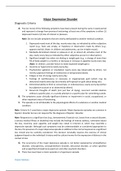Major Depressive Disorder
Diagnostic Criteria
A. Five (or more) of the following symptoms have been present during the same 2-week period
and represent a change from previous functioning; at least one of the symptoms is either (1)
depressed mood or (2) loss of interest or pleasure.
Note: Do not include symptoms that are clearly attributable to another medical condition.
1. Depressed mood most of the day, nearly every day, as indicated by either subjective
report (e.g., feels sad, empty, or hopeless) or observation made by others (e.g.,
appears tearful). (Note: In children and adolescents, can be irritable mood.)
2. Markedly diminished interest or pleasure in all, or almost all, activities most of the
day, nearly every day (as indicated by either subjective account or observation).
3. Significant weight loss when not dieting or weight gain (e.g., a change of more than
5% of body weight in a month), or decrease or increase in appetite nearly every day.
(Note: In children, consider failure to make expected weight gain.)
4. Insomnia or hypersomnia nearly every day.
5. Psychomotor agitation or retardation nearly every day (observable by others; not
merely subjective feelings of restlessness or being slowed down).
6. Fatigue or loss of energy nearly every day.
7. Feelings of worthlessness or excessive or inappropriate guilt (which may be
delusional) nearly every day (not merely self-reproach or guilt about being sick).
8. Diminished ability to think or concentrate, or indecisiveness, nearly every day (either
by subjective account or as observed by others).
9. Recurrent thoughts of death (not just fear of dying), recurrent suicidal ideation
without a specific plan, or a suicide attempt or a specific plan for committing suicide.
B. The symptoms cause clinically significant distress or impairment in social, occupational, or
other important areas of functioning.
C. The episode is not attributable to the physiological effects of a substance or another medical
condition.
Note: Criteria A–C constitute a major depressive episode. Major depressive episodes are common in
bipolar I disorder but are not required for the diagnosis of bipolar I disorder.
Note: Responses to a significant loss (e.g., bereavement, financial ruin, losses from a natural disaster,
a serious medical illness or disability) may include the feelings of intense sadness, rumination about
the loss, insomnia, poor appetite, and weight loss noted in Criterion A, which may resemble a
depressive episode. Although such symptoms may be understandable or considered appropriate to
the loss, the presence of a major depressive episode in addition to the normal response to a significant
loss should also be carefully considered. This decision inevitably requires the exercise of clinical
judgment based on the individual’s history and the cultural norms for the expression of distress in the
context of loss.
D. The occurrence of the major depressive episode is not better explained by schizoaffective
disorder, schizophrenia, schizophreniform disorder, delusional disorder, or other specified
and unspecified schizophrenia spectrum and other psychotic disorders.
E. There has never been a manic episode or a hypomanic episode.
Palane Mohlala





